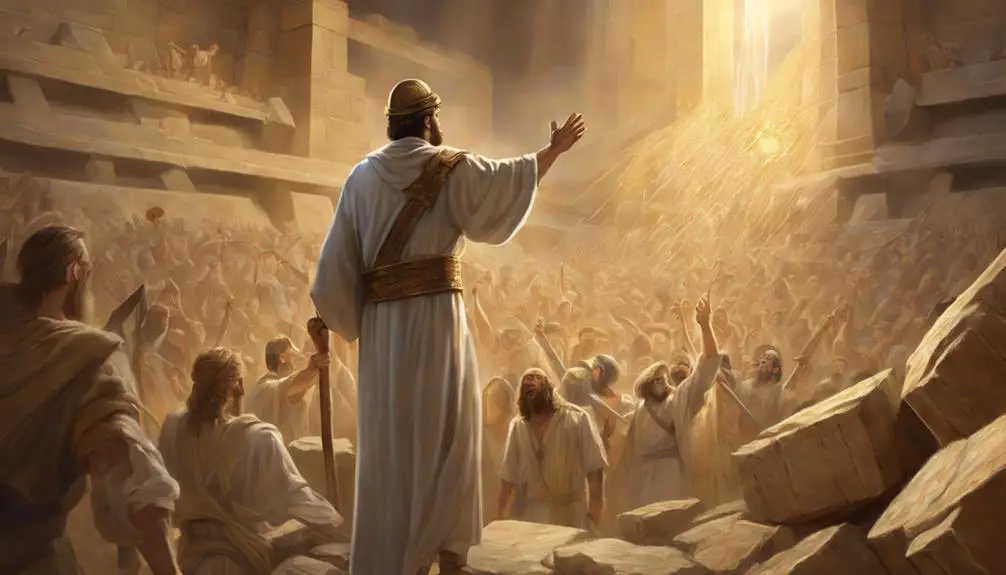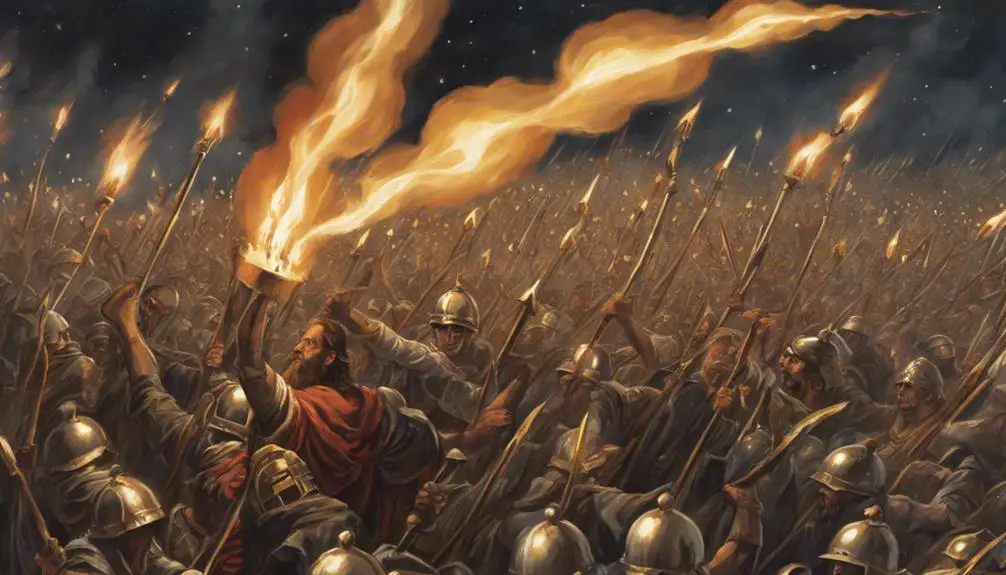Journey through biblical tales of valor and faith, where warriors conquer giants and lead nations with a spirit that defies the impossible.

Warrior Spirit in the Bible
Just as Hercules faced his twelve labors, figures throughout the Bible confront their own colossal challenges with a warrior spirit that's both inspiring and instructive. You've likely heard of David's triumph over Goliath, a testament to faith's power over brute strength. But beyond this familiar tale lies a rich tapestry of stories—Joshua's strategic conquests, Deborah's wise leadership, Gideon's miraculous victory, and Samson's prodigious strength, each revealing unique facets of the warrior spirit.
These narratives not only offer historical insights but also serve as profound lessons in courage, faith, and resilience. Yet, the true depth of these lessons is found in the details, where the essence of what it means to possess a warrior spirit in the face of insurmountable odds is vividly brought to life.
Key Takeaways
- Faith and obedience to divine guidance are foundational to achieving victory in biblical battles.
- Leadership in biblical narratives combines courage, wisdom, and a deep reliance on divine direction.
- True strength and triumph come from integrity, moral character, and honoring commitments to God.
- The complexity of divine purpose and human nature teaches lessons on humility, the dangers of pride, and the significance of inner strength.
David and Goliath: Faith Triumphs

In the story of David and Goliath, faith emerges as a potent force, demonstrating that belief can overcome seemingly insurmountable obstacles. This narrative not only epitomizes the clash between underdog and champion but also between humility and hubris. David's youth is often highlighted as a significant disadvantage, yet it serves as the crucible within which his faith is refined and showcased. Unlike his older, battle-hardened counterparts, David's reliance on faith rather than physical prowess or military experience underlines a profound theological insight: divine favor doesn't depend on human attributes or achievements.
Goliath's arrogance, on the other hand, exemplifies the dangers of overconfidence and self-reliance. His disbelief in David's ability to defeat him mirrors a broader skepticism about the power of faith and the divine. Goliath views the confrontation through a worldly lens, focusing solely on physical strength and the visible aspects of warfare. He fails to recognize the invisible, yet far more potent, dimension of spiritual strength that David brings into the battle.
Thus, the conflict between David and Goliath isn't merely a physical duel but a symbolic representation of the struggle between faith and doubt, humility and pride. David's victory serves as a testament to the belief that faith, when genuinely embraced, can dismantle the strongest of foes. It reminds you that true strength often lies not in what's seen, but in the unseen; not in the physical, but in the spiritual; not in oneself, but in one's faith in the divine.
Joshua's Conquest: Divine Strategy

Just as David's victory over Goliath underscores the power of faith, Joshua's conquest of Canaan demonstrates the critical role of divine guidance in military strategy. You'll find that the narrative surrounding the fall of Jericho's walls isn't just a tale of military might, but a profound lesson in following divine commands over conventional warfare tactics.
Here are three key elements that underscore the divine strategy in Joshua's conquest:
- Obedience to Divine Instructions: Joshua didn't rely solely on his military experience or the strength of his forces. Instead, he followed specific, unconventional instructions from God, such as marching around the city of Jericho for seven days. This act of faith and obedience was instrumental in the miraculous collapse of Jericho's walls.
- Moral and Ethical Considerations: The conquest raises complex ethical considerations, challenging you to ponder the nature of divine justice and the morality of warfare. It prompts a deeper exploration of the biblical narrative's context and the ethical frameworks within which these events are understood.
- The Role of Faith: Just as with David and Goliath, Joshua's victory highlights the power of faith in achieving what seems impossible by human standards. The conquest story teaches that success in even the most daunting battles comes from trusting in God's plan and timing.
Analyzing Joshua's conquest, you're encouraged to reflect on the strategic importance of faith and obedience over brute force. The ethical considerations involved invite a nuanced discussion about the actions taken during this period, challenging one to think critically about the implications of divine command in historical contexts.
Deborah's Leadership: Courageous Wisdom

Deborah's leadership exemplifies a profound blend of courage and wisdom, setting a pivotal example for navigating challenges with faith and strategic insight. At a time when Israel was oppressed, she rose as a beacon of hope, leveraging her prophetic authority to guide her people towards victory. Her story isn't just an account of military triumph but a testament to the power of female empowerment in a male-dominated society.
You'll find her narrative compelling, not merely for the battles won but for how she orchestrated those victories. Deborah didn't act impulsively. Instead, she listened, planned, and then acted, embodying the very essence of wise leadership. Her prophetic authority gave her insights that others lacked, yet it was her courage that moved her to act on those insights, rallying her people against formidable foes.
Her role as a judge over Israel wasn't just administrative; it was deeply spiritual and strategic. In an era where women were often sidelined, Deborah's position underscored the potential of female empowerment to bring about societal change. She didn't just lead from the front; she inspired Barak, demonstrating that true leadership involves upliftment and collaboration.
Deborah's story encourages you to view leadership through a lens of balanced wisdom and courage. It's a reminder that authority, whether prophetic or positional, requires the boldness to act and the wisdom to guide those actions towards a meaningful end. Through her, we see that leadership, rooted in faith and strategic insight, can overcome the most daunting challenges.
Gideon's Army: Miraculous Victory

Gideon's story unfolds a narrative where, against all odds, a mere 300 soldiers achieve a stunning victory, showcasing divine intervention and strategic genius. This account, rich in themes of fear management and the rise of unlikely heroes, offers profound insights into the nature of courage and divine guidance in the face of overwhelming adversity.
- Strategic Reduction: Initially, Gideon's army numbered 32,000. However, through a process of deliberate reduction, God whittled down the force to 300 men. This wasn't merely an act of diminishing numbers but a strategic move to ensure that the victory would clearly be attributed to divine intervention, not human might or numbers. This aspect of the story emphasizes the importance of reliance on spiritual guidance over apparent strengths.
- Fear Management: The selection process for Gideon's army involved a unique test of fear and awareness. Those who drank water directly from the river, showing a lack of vigilance, were sent home, while those who lapped water with their hands, ready for action, were kept. This innovative approach to fear management underscores the significance of alertness and preparedness in achieving success, especially under dire circumstances.
- Unlikely Heroes: The victory of Gideon's army is a classic example of how unlikely heroes can emerge victorious through faith and strategic cunning. Despite their small number and the vastness of the opposing forces, their unexpected victory serves as a powerful testament to the potential of the underdog when guided by divine will and wisdom.
Gideon's story, thus, serves as a compelling narrative on the power of faith, the wisdom of divine strategy, and the impact of fear management in overcoming seemingly insurmountable odds.
Samson's Strength: A Double-Edged Sword

While Gideon's story highlights the triumph of the few guided by faith, Samson's narrative reveals the complexities of strength when intertwined with personal failings and divine purpose. You delve into Samson's life, discovering that his Herculean strength, a gift from God, becomes a double-edged sword. His hair secret, the source of his power, symbolizes a covenant with God, yet it also foreshadows his moral downfall.
Your exploration reveals that Samson's physical might couldn't shield him from his weaknesses. His liaisons, particularly with Delilah, underscore how vulnerability and strength can coexist, leading to his ultimate capture. This juxtaposition serves as a poignant reminder of the dangers of pride and the importance of humility.
Aspect |
Insight |
|---|---|
Source of Strength |
Samson's hair, more than a mere physical trait, served as a tangible sign of his Nazirite vow and divine connection. |
Personal Failings |
Despite his physical prowess, Samson's inability to resist temptation led to his downfall, illustrating the battle between spiritual strength and human weakness. |
Divine Purpose |
Through Samson's story, you're reminded that strength is not solely for personal glory but for fulfilling God's will, even in the face of adversity. |
Moral of the Story |
Samson's life teaches that true strength lies in spiritual integrity and the ability to admit one's vulnerabilities, not in physical might alone. |
In analyzing Samson's narrative, you grasp the intrinsic message that strength, when divorced from wisdom and moral compass, can lead to one's downfall. His story serves as a timeless cautionary tale, emphasizing the importance of aligning one's gifts with divine purpose and moral integrity.
Frequently Asked Questions
How Do Modern Interpretations of the Bible Reconcile the Concept of a "Warrior Spirit" With Teachings of Peace and Nonviolence?
You're exploring how modern Bible interpretations balance the martial imagery with teachings of peace, a seeming peaceful paradox. Scholars suggest that the 'warrior spirit' symbolizes inner strength and moral courage rather than literal violence.
This interpretation aligns with nonviolence by advocating for fighting against injustice and sin through faith and love. It's a nuanced understanding that reconciles these concepts by emphasizing spiritual battle over physical conflict, offering a profound insight into biblical teachings.
What Psychological Insights Can We Gain From the Bible's Depiction of Warriors, and How Can These Insights Apply to Contemporary Challenges?
Exploring psychological insights from historical figures can unlock understanding of mental resilience and ethical dilemmas. By analyzing their experiences, you'll see how they navigated adversity, which is invaluable for tackling today's challenges.
This approach reveals the importance of perseverance and moral judgment in overcoming obstacles. Thus, delving into these narratives provides a blueprint for cultivating a resilient mindset and making ethical decisions in the face of contemporary trials.
How Do the Warrior Stories in the Bible Influence the Concept of Leadership and Resilience in Today's Society?
You'll find that stories of leadership and resilience deeply influence today's society, shaping concepts of military leadership and cultural resilience.
These narratives offer insights into handling adversity and leading with courage. They don't just inform strategies but embed a spirit of perseverance in challenging times.
In What Ways Do Non-Combatant Characters in the Bible Exhibit a "Warrior Spirit" Through Their Faith and Actions?
You'll find that non-combatant characters like Daniel and Esther showcase a 'warrior spirit' through their steadfast faith and bold actions.
Daniel's determination in the lion's den, refusing to renounce his faith, and Esther's bravery in approaching the king, risking her life to save her people, exemplify this spirit.
Their actions, driven by deep faith, offer a profound insight into how conviction and courage can manifest, influencing leadership and resilience.
How Do Different Christian Denominations Interpret the Warrior Spirit in the Context of Spiritual Warfare and Moral Struggles?
You're opening a can of worms when you delve into how Christian denominations interpret the warrior spirit, especially concerning spiritual warfare and moral struggles. Different denominational doctrines offer unique perspectives, shaping believers' spiritual armory.
While some emphasize prayer and faith as their main weapons, others may prioritize acts of service or the sacraments. Analyzing these varied interpretations provides deep insights into the broader concept of battling against spiritual and moral adversities.
Conclusion
In dissecting these biblical narratives, you've journeyed through a tapestry of divine intervention and human courage. From David's unwavering faith to Deborah's wise leadership, the warrior spirit isn't just about physical battles; it's about fighting with conviction and strategy.
Like Gideon's select few, it teaches us that victory often requires more than sheer numbers—it demands faith. So, let's embrace our inner warriors, not with swords, but with the strength of our convictions, and march forward.



Sign up